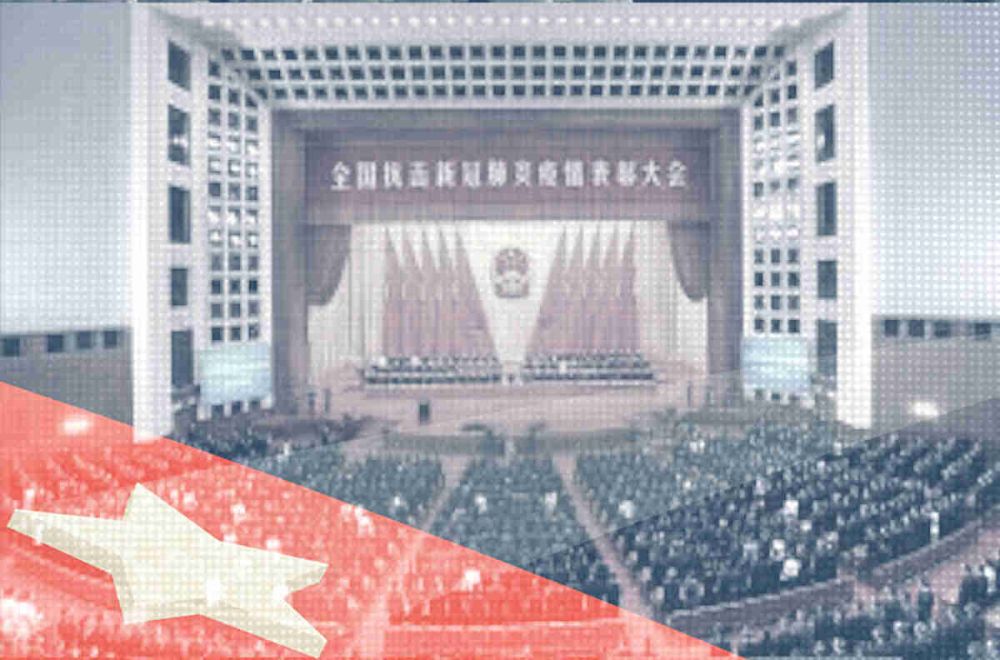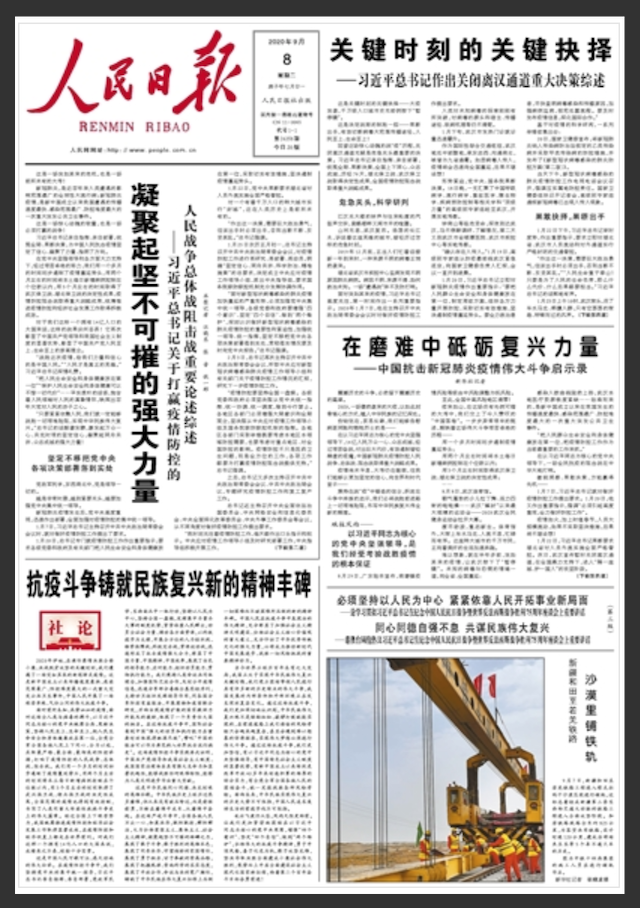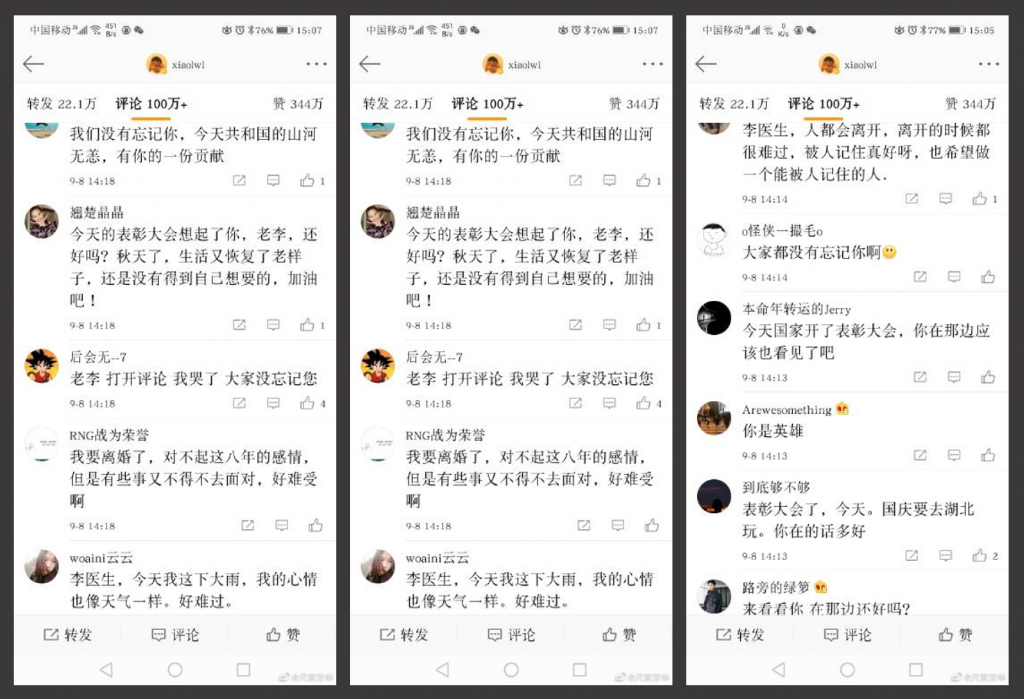
The top official news story in China today is the national celebration event for the country’s fight against COVID-19, a so-called “commendation ceremony,” or biaoyang dahui (表扬大会), televised live from the Great Hall of the People. The event culminated as Xi Jinping, who delivered a speech about how “China’s power” and “China’s responsibility” were proven by its pandemic response, draped a golden Medal of the Republic, the country’s highest honor, over the neck of respiratory disease expert Zhong Nanshan (钟南山).
Three others, including disease experts Zhang Boli, Zhang Dingyu and Chen Wei, were given People’s Hero medals, all four taking to the stage to a chorus of trumpets. Zhang Boli, president of Tianjin University of Traditional Chinese Medicine, has this year been an outspoken advocate of the use of TCM to fight COVID-19. Zhang Dingyu is the top official at Wuhan’s Jinyintan Hospital (and state media have made much of the fact that he suffers from ALS, a true selfless soldier). Chen Wei is a medical researcher with the People’s Liberation Army who has been involved in vaccine research.
The entire front page of the People’s Daily newspaper is dominated today by the declaration of the Chinese Communist Party’s victory over the disease, and a lead editorial refers to the anti-epidemic effort as a “great spiritual achievement.”

The final, penultimate paragraph of this shelun (社论) provides the clearest picture of what the pomp and circumstance today were really about – namely, the home stretch in the leadership’s marathon re-positioning of the COVID-19 pandemic as a story about the power and position of Xi Jinping and the CCP. The paragraph is jam-packed with political phrases meant to signal loud and clear that Xi Jinping is strong, and that the CCP is back on track when it comes to central agendas for 2020, including the achievement of “a comprehensively well-off society.”
In quick succession, it gives us a poetic reference to Mao Zedong (乱云飞渡仍从容), a reiteration of Xi Jinping as the CCP’s “core,” and a mention of the so-called “442 formula,” ultimately about pledging allegiance to Xi.
Riotous clouds sweep past, swift and tranquil, and we move forward through the storm unimpeded. Let us unite even more closely around Comrade Xi Jinping as the core of the CCP Central Committee, strengthening the “four consciousnesses”, strengthening the “four self-confidences,” and achieving the “two safeguards,” bearing forward the great spirit of the anti-epidemic fight. [Let us] bravely open our sails and take the lead, turning crisis into opportunity, daring to overcome difficulties, resolutely achieving the great victory of building a comprehensively well-off society, taking advantage of the situation and embarking on a new journey of fully building a socialist modern society, and marching bravely towards the second centenary goal!
The Mao reference here to “riotous clouds” sweeping past should be understood as a reference to storms of criticism from other countries that have buffeted China in recent months – from the United States, Australia, Canada, India, the Czech Republic and other EU member states. The winds may be strong, the reference suggests, but Xi Jinping steadies the Party as helmsman.
Sweeping away international concerns about human rights in China –which were recently raised during Foreign Minister Wang Yi’s recent trip to Europe — Zhong Nanshan said in his address to the commemoration ceremony today (pictured at the top of this article): “What is the greatest human right? We saved so many lives, and this is the greatest expression of our human rights.”
But beyond the official propaganda today there were eyerolls of irritation, sighs of resignation, and sometimes lightning flashes of oblique disobedience.
Even as the live “commendation ceremony” commemorated the heroic eight-month “struggle,” emphasizing Party and country, users on social media fought to raise the voices of those who were conspicuously absent. Many of the comments were tributes to Li Wenliang (李文亮), the Wuhan doctor who was interrogated and harshly reprimanded by police in December 2019 for sharing information about on WeChat about suspicious cases of pneumonia.
State media made no mention whatsoever of Li Wenliang today, but users flocked to the Li’s account on the Sina Weibo platform, which remains available, and posted comments, many addressing him directly.

“They have begun the praises, but we have not forgotten you,” said one user as the ceremony was underway. Wrote another: “It doesn’t matter who they praise, or whether or not they mention you. We remember.”
Referring to the live ceremony, one user wrote: “All of these awards go to Li Wenliang, and they are just collecting them on his behalf. It’s so excessive!” Another said, addressing the deceased doctor directly: “It is you who are our hero.”
Still others rejected the notion of heroism, suggesting such honors only spoiled the genuineness of basic acts of professional courage, such as that shown early on by Li Wenliang. “Doctor Li was a good doctor, but don’t render him as a hero.”
Direct criticism of the government could not be readily found among the comments, but one user could barely contain his scorn for the proceedings. He referenced Lu Xun’s 1919 short story “Medicine,” the writer’s indictment of dimwitted superstition and conformity to power, in which poor and illiterate parents attempt to cure their son’s tuberculosis by offering him a steamed bun soaked in the blood of an executed revolutionary. “How do the blood-soaked dumplings taste?” he asked.
Weibo user “Che Su Youth” (尺素芳华) aggregated 8 images of recent comments made to Li Wenliang into a single image with a commemorative sketch of Dr. Li at the center, a post that itself received 217,000 “likes.” Since February 1 this year, more than one million comments have been left on Weibo account of Li Wenliaang, who passed away on February 7 from COVID-19.




















